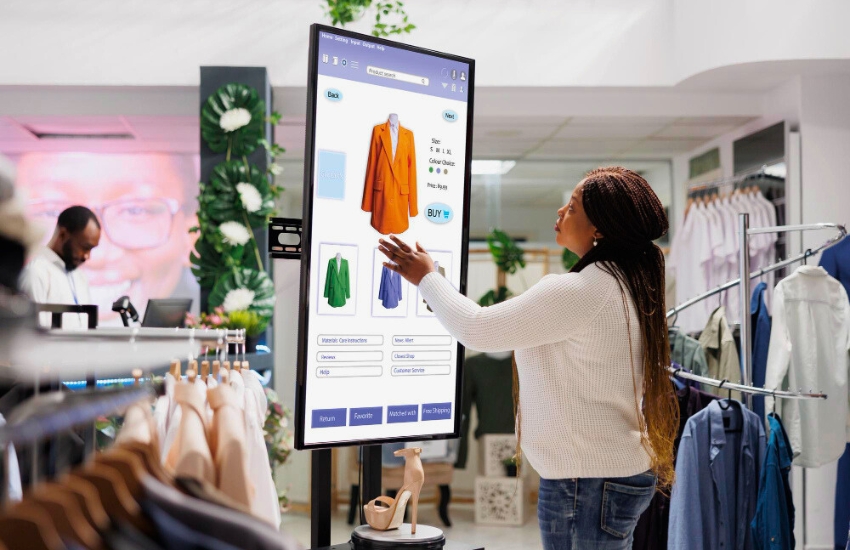Remember when every headline between 2018 and 2023 read something like:
“AI will replace millions of retail jobs.”
Well, here we are in 2025, and retail is still one of the most human-centered industries on the planet.
Sure, AI changed retail.
It automated tracking updates, categorized tickets, flagged fraud, and wrote quick responses. But instead of eliminating people, it elevated them.
AI didn’t replace retail workers.
It replaced tasks, not talent.
Today’s top-performing retailers across the U.S., Canada, the EU, and China are not fully automated, nor fully human. They’re powered by hybrid CX teams, a blend of human expertise and intelligent automation working side-by-side.
“Retail CX was never supposed to be human or AI. The winning model is human and AI.”
Clara Nieves, Senior Analyst, Retail Innovation Observatory (RIO)
And the numbers prove it.
According to Gartner, retailers who implemented hybrid CX models saw a 27% lift in resolution accuracy and a 32% reduction in service costs, without layoffs.
Even better: customer satisfaction increased because humans finally had time to do, well… human things.
Let’s break down how we got here, and why hybrid CX teams are now the backbone of modern retail success.
Section 1: Why AI Couldn’t Replace Humans, Especially in Retail
Retail CX is one of the most nuanced service categories in the world.
It involves:
- Size/fit recommendations (apparel)
- Shade matching (beauty)
- Device compatibility (electronics)
- Installation guidance (home improvement)
- Marketplace compliance support (Amazon / Walmart / TikTok shop)
- Returns and refund processing
- Social shopping DMs
- Global shipping complexity
AI can assist, but it cannot replicate lived product knowledge, emotional intelligence, or situational judgment.
Here’s why AI alone fell short:
1. Retail questions are precise and often unpredictable
A chatbot can handle:
- “Where is my order?”
- “Send return label.”
- “Cancel order.”
But not:
- “Is shade 4N too warm for medium-toned olive skin?”
- “Will this drill bit work with Canadian electrical standards?”
- “My TikTok influencer recommended size M, but I’m between sizes.”
These require interpretation, not automation.
2. Retailers need conversation, not canned responses
AI excels at speed, not connection.
And retail shoppers reward brands that feel human.
That’s why 80% of consumers still prefer a human for complex questions, as per Salesforce.
3. Sensitive issues demand empathy, not efficiency
Try using a chatbot for:
- Damaged delivery complaints
- Wrong-size frustrations
- First-time tech buyers
- Cross-border shipping problems
It doesn’t end well.
4. Retail workflows aren’t linear
A beauty buyer might ask about:
Shade > bundle > shipping > promo > return policy > TikTok discount
AI handles the first two. Humans close the sale.
Section 2: So, What Did AI Actually Replace?
AI didn’t take away jobs; it took away the parts of retail work nobody liked:
- Repetitive ticket tagging
- Checking order status
- Answering duplicate FAQs
- Logging product-level complaints
- Triaging customer inquiries
- Detecting fraud patterns
- Flagging repeat issues
- Scraping marketplace rule changes
That freed human agents to focus on:
- Pre-purchase guidance
- Cross-selling
- Solving complex issues
- Building emotional trust
- Recovering failing customer journeys
- Supporting high-value marketplace accounts
Retail productivity didn’t decline. It skyrocketed.
This paved the way for new roles.
Section 3: The New Retail Jobs AI Created (Not Destroyed)
Here are some of the roles that didn’t exist five years ago, roles that ServeRetail now hires, trains, and deploys globally:
1. CX Product Specialists (Apparel, Beauty, Electronics)
These are experts who guide buyers:
- Choosing the right size
- Matching foundation shades
- Determining tech compatibility
- Recommending bundles
AI provides data. Humans make the right decision.
2. Social Commerce Response Managers
Shoppers now send pre-sale questions through:
- Instagram DMs
- TikTok Shop chat
- Facebook Marketplace messages
- Pinterest Product Pins
- Xiaohongshu (China)
- WhatsApp Business
Retailers need humans who speak in brand voice, analyze buyer intent, and turn conversations into conversions.
3. AI Supervision Agents (AI + Human Hybrid Role)
These professionals:
- Correct AI mistakes
- Refine response quality
- Train AI models with retail-specific knowledge
- Ensure compliance
- Prevent hallucinations
This job category literally didn’t exist pre-2023.
4. Marketplace Compliance Specialists
Amazon, Walmart, TikTok Shop, Zalando, and Temu all updated their rules in 2024–2025.
Hybrid teams:
- Monitor seller metrics
- Prevent penalties
- Manage returns
- Guide buyers
- Validate tracking numbers
- Coordinate retail order processing
AI flags issues. Humans fix them.
5. CX Data Interpreters
AI produces vast data: sentiment scores, ticket categories, and issue trends.
But interpreting that data and connecting it to real retail behavior requires human intelligence.
6. Post-Purchase Customer Experience Managers
Modern retail expects:
- Faster refunds
- Smarter bundling
- Proactive delivery updates
- Micro-personalization
Hybrid teams manage this proactively, using AI for alerts and humans for resolution.
Section 4: Why Hybrid CX Teams Outperform Fully Automated or Fully Human Teams
Retailers who tried to go “AI-only” quickly reversed course.
Retailers who stayed “human-only” fell behind.
But brands that adopted hybrid models saw the best results:
1. Faster response times (AI triage + human expertise)
AI reduces response times by up to 70%, freeing humans for deep work.
2. Lower return rates
Especially in apparel, beauty, and electronics.
AI provides data. Humans guide product choice > fewer returns.
ServeRetail clients see a 20–30% reduction in returns within 90 days.
3. Higher conversion rates
Pre-purchase guidance + fast replies = higher conversions.
Especially in:
- Social commerce
- TikTok Shop live selling
- EU apparel fittings
- Cross-border electronics purchases
4. Better marketplace compliance
AI flags issues. Humans prevent penalties.
Retailers avoid:
- Amazon late shipment flags
- Walmart cancellation penalties
- TikTok Shop performance hits
5. Global coverage without burnout
Hybrid teams handle:
- U.S. daytime
- EU evening
- China morning
- Canada weekend spikes
Seamless, scalable, cost-effective.
Section 5: How ServeRetail Builds World-Class Hybrid CX Teams
ServeRetail combines:
AI for:
- Ticket routing
- Intent detection
- Return automation
- Fraud flagging
- Rule change alerts
- Conversational drafts
- Sentiment scoring
Humans for:
- Apparel sizing
- Beauty shade matching
- Electronics troubleshooting
- Marketplace compliance
- Empathy-driven support
- Social commerce conversions
- Retail order processing services
This is why retailers choose ServeRetail to support U.S., Canada, EU, and China operations.
Conclusion: AI Didn’t Replace Retail Jobs, It Rewrote Them
The retail industry didn’t lose jobs. It gained better jobs.
Today’s retailers need:
- Humans who think
- AI that accelerates
- Teams that collaborate
- Workflows that adapt
- Support that sells
- CX that understands global shoppers
Hybrid CX teams are not the future of retail. They are the present, and ServeRetail is already powering them.
Ready to build your hybrid retail CX workforce?
ServeRetail can help you scale globally with intelligent automation + exceptional human talent.









